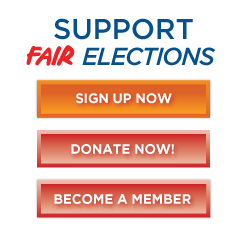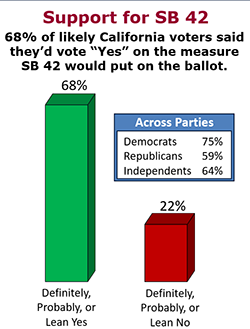SACRAMENTO -- Today, Governor Jerry Brown signed the Social
Media DISCLOSE Act (AB 2188), another landmark campaign
disclosure bill that makes California a national leader in
of disclosure in online political ads.
"Last year, the California DISCLOSE Act (AB 249) set
the standard for campaign finance disclosure for print,
television and radio ads, generated for and against state
initiatives and candidates," said AB 2188 author
Assembly Speaker pro Tem Kevin Mullin. "AB 2188
extends those tough requirements to social media,
giving voters the ability to see the top three funders of
political ads on the various social media
platforms."
Assembly Bill 2188, authored by Assemblymember Mullin,
working the California Clean Money Campaign, requires
online platforms like Facebook, Google, and Twitter to
accompany ballot measure ads and independent expenditure
ads about candidates with a clear list of the
committee's name and top three funders of $50,000 or
more. If the platform shows the name of the committee
on the ad (instead of linking to it), they must first list
the top three funders.
Importantly, AB 2188 uses the nation-leading rules from AB
249, the California DISCLOSE Act (passed in 2017) that
follow the money to identify original donors even when
funds pass through multiple committees. AB 2188 also
requires the platforms to keep a public database of all the
political ads a committee pays for.
"With Governor Brown signing this landmark follow-up to
the California DISCLOSE Act, we start shining a light on
secret political money on social media by requiring,
for the first time anywhere, that ballot measure ads and
outside ads attacking or supporting candidates on social
media show their top three funders," said Trent Lange,
President of the California Clean Money Campaign.
"Every American who cares about democracy owes
Governor Brown, Assembly Speaker pro Tem Kevin Mullin, and
all the bold leaders in the California Legislature of both
parties who helped AB 2188 pass an enduring debt of
gratitude."
AB 2188 passed through the legislature on overwhelming
bipartisan votes. It passed the Senate 31-8 with Senator
Jerry Hill (D-San Mateo) as floor manager, in a landslide
and bipartisan vote of 31-8 with every Democrat voting
"Yes" joined by Republican Senators Anthony Cannella
(R-Ceres), Ling-Ling Chang (R-Brea), John Moorlach (R-Costa
Mesa), Janet Nguyen (R-Garden Grove), and Scott Wilk
(R-Santa Clarita). It passed the Assembly 69-3 with 54
Democratic votes and with Assemblymember Dante Acosta
(R-Santa Clarita) showing particular bipartisan leadership
for transparency in campaign financing by helping AB 2188
achieve a record 15 Republican Assembly votes, along with
Assemblymembers Catharine Baker (R-San Ramon) and Marc
Steinorth (R-Rancho Cucamonga) standing out by speaking in
support of AB 2188 on the Assembly floor.
Sweeping grassroots activism and coalition support were
fundamental to AB 2188's decisive passage. Tens of
thousands signed online petitions, sent emails, and
submitted official web comments. Thousands called their
legislators and Gov. Brown, and hundreds of volunteers
gathered 26,000+ signatures. AB 2188 was supported by 31
state and national groups for good government and the
public interest ranging from California Common Cause,
CALPIRG, the League of Women Voters of California, and
Money Out Voters-In, to California Church Impact, the
California League of Conservation Voters, Consumer
Federation of California, and Courage Campaign.
Campaign spending in California has steadily increased with
each election cycle, with over $1 billion spent on
statewide ballot measures between 2012 and 2016. Before the
implementation of AB 249, donors could hide behind layers
of misleading organization names and top donors could be
concealed by campaigns. The DISCLOSE Act strengthened the
requirements for disclosing the names of the top three
funders of ballot measures and independent expenditures on
television, radio and print ads -- and now AB 2188 extends
those same requirements to online platforms.
"This legislation was successful because industry
stakeholders listened and responded to the concerns raised
about the lack of transparency related to advertising on
social media and other online platforms," Mullin
added. "Everyone who participated in our discussions
demonstrated a commitment to our democracy and to
transparency in our elections. As the epicenter of social
media technologies, it stands to reason that California
would create a strong disclosure template to be replicated
by other states, and hopefully (eventually) the federal
government."
#####
California Clean Money Campaign is a non-partisan 501(c)(3)
organization that has been dedicated to educating the
public about the need to lessen the unfair influence of Big
Money on election campaigns since 2001. For further
information, visit www.CAclean.org.



